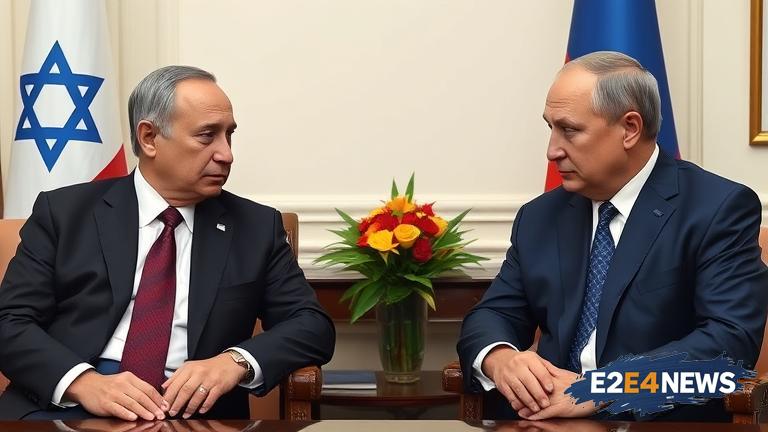Russian President Vladimir Putin and Israeli Prime Minister Benjamin Netanyahu engaged in a phone call to discuss the ongoing situation in Syria. Putin stressed the need to maintain Syria’s territorial integrity, a stance that Russia has consistently upheld throughout the Syrian conflict. The call comes amidst heightened tensions in the region, with Israel having conducted numerous airstrikes against Iranian and Hezbollah targets in Syria. Putin’s emphasis on territorial integrity is seen as a warning to Israel to refrain from taking actions that could destabilize the region further. The Russian leader also reiterated his commitment to the sovereignty and independence of Syria, emphasizing the importance of respecting international law and the principles of the United Nations Charter. Netanyahu, on the other hand, expressed Israel’s concerns about the growing Iranian presence in Syria and the potential threat it poses to Israel’s national security. The Israeli prime minister has repeatedly stated that Israel will not tolerate an Iranian military presence in Syria and has taken military action to prevent it. The phone call between Putin and Netanyahu highlights the complex and delicate nature of the relationships between Russia, Israel, and Syria. Russia has been a key ally of the Syrian government, providing military support and diplomatic backing throughout the conflict. Israel, on the other hand, has been wary of Iran’s growing influence in the region and has taken steps to counter it. The United States has also been involved in the conflict, providing support to various rebel groups and conducting airstrikes against ISIS targets. The situation in Syria remains volatile, with multiple factions vying for control and influence. The Syrian government, backed by Russia and Iran, has made significant gains in recent years, but opposition groups and extremist organizations continue to pose a threat. The international community has called for a peaceful resolution to the conflict, but a lasting solution remains elusive. The phone call between Putin and Netanyahu is seen as an attempt to reduce tensions and prevent further escalation in the region. However, the underlying issues and competing interests of the various parties involved make it challenging to achieve a lasting peace. The Syrian conflict has resulted in significant humanitarian suffering, with millions of people displaced and thousands killed. The international community has a responsibility to work towards a peaceful resolution and to provide support to those affected by the conflict. The phone call between Putin and Netanyahu is a step in the right direction, but more needs to be done to address the underlying issues and to find a lasting solution. The situation in Syria remains a complex and challenging issue, requiring a coordinated and sustained effort from the international community to resolve. The call for maintaining Syria’s territorial integrity is a crucial aspect of any potential solution, as it is essential for ensuring the country’s stability and sovereignty. The international community must work together to find a peaceful resolution to the conflict, one that respects the sovereignty and independence of Syria and addresses the legitimate concerns of all parties involved. The phone call between Putin and Netanyahu highlights the importance of diplomacy and dialogue in resolving conflicts and preventing further escalation. It is essential for leaders to engage in open and honest communication to address the underlying issues and to find common ground. The situation in Syria is a stark reminder of the devastating consequences of conflict and the importance of working towards peace and stability. The international community must learn from the lessons of the past and work towards a more peaceful and stable future. The call for maintaining Syria’s territorial integrity is a crucial step in this direction, and it is essential that all parties involved work towards a peaceful resolution that respects the sovereignty and independence of Syria.





